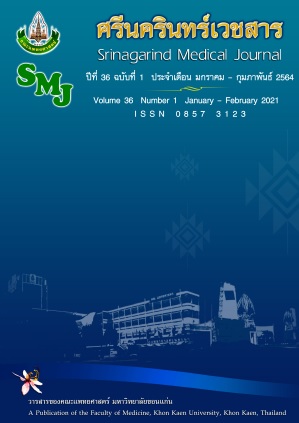Survival Rate of Lung Cancer Patients after Diagnosis in Srinagarind Hospital: An Update data on the Srinagarind Hospital -Based Cancer Registry between 2013 and 2017
Keywords:
Lung Cancer; Survival Rate; Hospital-Based Cancer RegistryAbstract
Background and Objective: This is the lastest data for tertiary hospitals. The objective of this research was to determine the survival rate of lung cancer patients after diagnosis at Srinagarind hospital.
Methods: Data were collected from the Srinagarind hospital-based cancer registry (2013-2017), and followed up until 2019 of 2,149 cases. The survival rate was estimated using the Kaplan-Meier method. A comparison group was used to estimate the survival rate using the Log-rank test. We reported the median survival time and the 95% confidence interval.
Result: Of 2,149 lung cancer patients, 1,867 died during the study which corresponding to a case-fatality rate of 86.0 per 100 person-years (95%CI; 82.1 - 90.0). The median survival time was 0.46 years (95%CI; 0.42 - 0.50). The respective overall survival experience rate after diagnosis at 1, 3, and 5 years was 31.2% (95%CI; 29.2 - 33.2), 12.9% (95%CI; 11.5 - 14.5), and 10.2% (95%CI; 8.7 - 11.7). The survival rate between targeted therapy and nontargeted therapy were statistically significant. (Log-rank test = 59.9, p = 0.001)
Conclusion: The survival rate of lung cancer at 5 years after diagnosis was poor. Further research should focus on the factors affecting the effectiveness of targeted therapy for lung cancer.
References
2. Imsamran W, Pattatang A, Supaattagorn P, Chiawiriyabunya I, Namthaisong K, Wongsena M, et al. Cancer in Thailand Vol. IX, 2013-2015. Bangkok: New Thammada Press (Thailand) Co., Ltd. 202 Soi Charoenkrung 57, Yannawa, Sathorn, Bangkok 10120 Thailand; 2018.
3. ฉลองพล สารทอง, หัชชา ศรีปลั่ง, อนัฆพงษ์ พันธุ์มณี, พอใจ พัทธนิตย์ธรรม. แนวโน้มและการคาดการณ์อุบัติการณ์โรคมะเร็งปอด จังหวัดขอนแก่น. ศรีนครินทร์เวชสาร 2561; 33: 222-228.
4. Ramathibodi cancer report 2016. In annual report of Ramathibodi cancer registry. Faculty of Medicine, Ramathibodi hospital Mahidol University. [cited 2020 May 9];/Available from: https://www.rama.mahidol.ac.th/cancer_center/sites/default/files/public/cancerreport/pdf/cancer_report_2016_0.pdf
5. Srisam-ang K, Podhipak A, Narksawat K, Supaattagorn P, Tipayamongkholgul M. Suvival of patients with advanced non-small cell lung cancer at Ubon Ratchathani cancer center, Thailand. Southeast Asian J Trop Med Public Health 2005; 36: 994-1006.
6. Punjaruk W, Suwanrungruag K, Wirasorn K. Non-small cell lung cancer (NSCLC) in Srinagarind hospital: 2000-2010, Hospital Based. Srinagarind Med J 2015; 30: 110-115.
7. Van Meerbeeck JP, Kramer GWPM, Van Schil PEY, Legrand C, Smit EF, Schramel F, et al. Randomized controlled trial of resection versus radiotherapy after induction chemotherapy in stage IIIA-N2 non-small cell lung cancer. J Natl Cancer Inst 2007; 99:442–450.
8. Sukauichai S, Tovanabutra C, Wanglikitkul S, Chomprasert K. Survival of patients with advanced NSCLC treated with first-generation EGFR-TKIs at a cancer hospital in Thailand, 2011-2016. medical-oncology [Internet]. 2018 [cited 2020 May 21];03(02). Available from: http://www.alliedacademies.org/articles/survival-of-patients-with-advanced-nsclc-treated-with-firstgeneration-egfrtkis-at-a-cancer-hospital-in-thailand-20112016-10649.html
9. Inoue A, Kobayashi K, Maemondo M, Sugawara S, Oizumi S, Isobe H, et al. Updated overall survival results from a randomized phase III trial comparing gefitinib with carboplatin–paclitaxel for chemo-naïve non-small cell lung cancer with sensitive EGFR gene mutations (NEJ002). Ann Oncol 2013; 24:54–59.
10. Phunmanee A, Wirasorn K, Thavornpitak Y, Sookprasert A, Chindaprasirt J. Lung cancer in hospitalized patients of Thailand. J Med Assoc Thai. 2012 [cited 2020 May 9]. /Available from: http://www.thaiscience.info/Journals/Article/JMAT/10971724.pdf
11. Sekine I, Shintani Y, Shukuya T, Takayama K, Inoue A, Okamoto I, et al. A Japanese lung cancer registry study on demographics and treatment modalities in medically treated patients. Cancer Sci 2020; 111: 1685–1691.
12. Borghaei H, Paz-Ares L, Horn L, Spigel DR, Steins M, Ready NE, et al. Nivolumab versus docetaxel in advanced non-squamous non–small cell lung cancer. N Engl J Med 2015; 373:1627–1639.
13. หัชชา ศรีปลั่ง. รายงานความก้าวหน้าโครงการ การศึกษาทบทวนองค์ความรู้ที่มีอยู่ของโรคมะเร็งปอดที่เป็นผลจากการสูบบุหรี่; 2553 [cited 2020 May 18]/Available from: http://www.trc.or.th/trcresearch/pdffiles/ART%2020/cat20%20(8).pdf




